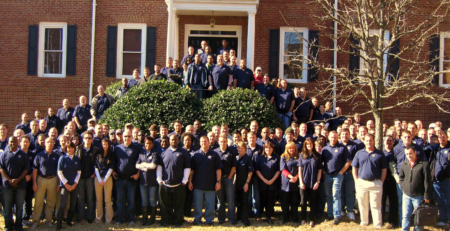HERE’S WHAT YOU NEED TO LAND THE BEST JOBS
You don’t have to be a math whiz or have a Ph.D. to earn $100,000

SAN FRANCISCO May 30, 2017
The nation’s best jobs boast salaries that average $100,000 and up, offer generous company benefits and promise to have recruiting suitors fighting for your hand.
But they are highly technical roles carrying job descriptions like DevOps engineer and analytics manager that demand an alphabet soup of computer skills as well as incessant on-the-job learning.
So do you have to be a math genius with a spare Ph.D. in physics to get one of these great gigs? What we found might surprise you.
USA TODAY conducted a series of interviews with people in the nation’s top jobs, as well as with those recruiting and training candidates for these roles. Our mission was to see just how obtainable these plum posts are, whether you’re a student looking for a profession or a career-changer seeking better pay in a booming field.
The market for tech talent is so hot that technology jobs now rate as the best type of employment opportunities in the nation.
A 2017 survey of the top jobs in America by employer ranking and assessment site Glassdoor — based on earning potential, job satisfaction and number of openings — ranked data scientist, Dev-Ops engineer, data engineer and analytics manager as the 1, 2, 3, and 5 top jobs (the fourth was tax manager). That’s also the second year in a row data scientist took the top slot.
Other jobs surveys, including one from search site Indeed.com, have echoed these results, reflecting a cloud computing-driven surge in information capture.
The good news? Not only do you not necessarily have to be a rocket scientist, although we did speak with one, some folks in these roles are entirely self-taught.
But you’ll need free time to acquire or polish skills and languages (Python, SQL and AWS, to name a few), plus often money for training sessions. While some we talked to honed their skills solo, often using online courses, many recommended an intense type of trade school called a boot camp. Some are inexpensive, but others can cost five figures.
You also don’t need to be a numbers whiz — or even like math. But distilling massive quantities of information requires comfort with computing and data sets.
“One problem our industry has is there’s really no school for it,” says Leslie Carr, an infrastructure engineering manager and former senior DevOps engineer with Clover Health, which uses data science to improve health care for seniors.
“Not only is there no degree in DevOps, if someone did have a degree from four years ago and hasn’t being doing it all, their knowledge would be out of touch,” Carr says.
That all may seem a bit daunting. But the flip side is that these jobs are plentiful and are expected to grow.
They also aren’t just at tech companies in Silicon Valley, Austin or Seattle but may very well be at a health care start-up in Nashville, an auto manufacturer in Detroit or just about any company that wants to analyze their data to improve the bottom line.
Companies are eager to fill these positions because “it’s not just software that’s eating the world, but data, because it informs every decision companies now make,” says Nidhi Gupta, senior vice president of engineering at Hired.com.
“Five to 10 years ago, the tech jobs were all about Web and mobile development, which was largely about coding,” says Ryan Aylward, chief technology officer at Glassdoor. “To be successful now in these data-focused roles, you have to have an analytical mind-set,” says Aylward. “With the right foundation, you can be OK with a variety of backgrounds.”
Plus, despite much talk of late about automation slowly killing traditional jobs, data science is to some degree robot-proof as it demands a human touch to creatively solve problems with the help of computers.
HOW TO GET THEM
From a self-taught actress and a military medic to a baseball-crazed statistician and plasma physics scholar, the backgrounds of people who have found their way to data science jobs is broad. But wherever they started, they had to pick up the specific skills these jobs demand.
Some universities are tweaking their curriculums to acknowledge this skill-set shift. But where colleges fall short, other training organizations have jumped into the gap.
Paid bootcamps up the ante and the promises. These include Galvanize, whose six-month data engineering course costs $17,000 and offers a solid track record of employment for graduates.
“The supply imbalance of open jobs and the lack of skills is pretty staggering,” says Galvanize CEO Jim Deters, who likes to call his venture “the people’s MIT.”
Deters says his students have included Best Buy clerks, frozen-yogurt stand workers and a homeless person.
“We’re looking for somebody that has the inclination and the right attitude towards learning, and we’ll give them the skills,” he says.
At the University of Washington, the place where Bill Gates honed his computer lab skills, students increasingly are being exposed to the concept of managing tremendous amounts of data, says Bill Howe, associate director of the school’s eScience Institute.
“We’re trying to find a set of requirements that different departments can meet in different ways,” says Howe, citing analytics, data management and visualization as key focus areas. “These days, being good at data means you could get a job anywhere. Nordstrom, the post office, Walmart, they’ve all got analytics groups.”
Marco della Cava and Eli Blumenthal
@marcodellacava; @eliblumenthal USA TODAY
CED Solutions is a Cisco Learning Partner, Microsoft Gold Learning Partner and the #1 location for Microsoft Certifications in North America for the last 6 years combined. CED Solutions is a CompTIA Partner, EC Council Partner, and many others and is one of the largest providers of training in North America. The Atlanta facility provides IT training for up to 300 students per day, with separate buildings dedicated to training. CED Solutions provides training thousands of students per year and students take hundreds of certification exams every two weeks.
CED Solutions provides training and certification for MCSD: SharePoint 2013 Applications Developer; MCSE: SharePoint 2013; Cisco CCNA; Cisco CCNP; Cisco CCNA Security; Cisco CCNP Security; Cisco CCNA: Collaboration; Cisco CCNP: Collaboration; Microsoft MCSA: Windows 2012 Server; MCSA: Windows 2016 Server; MCSA: SQL 2016 Server; MCSE: Business Intelligence SQL 2012 Server; MCSE: Data Platform SQL 2012 Server; MCSE: Desktop Infrastructure Windows 2012 Server; MCSE: Server Infrastructure Windows 2012 Server; MCPD: 6 Cert Visual Studio Developer; MCSD: Windows Store Apps C#; MCSD: Windows Store Apps HTML5; IT Healthcare Technician and many more.
CED Solutions, LLC, www.cedsolutions.com, info@cedsolutions.com, (800) 611-1840



